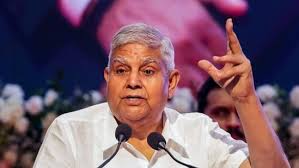EC sets ball rolling for Vice-Presidential election, days after Dhankhar’s surprise resignation

The Election Commission of India (ECI) has initiated the process to elect the next Vice President, just days after Jagdeep Dhankhar unexpectedly resigned. His sudden decision has created a political stir and raised questions about the reasons behind the move.
On Tuesday, Chief Election Commissioner Rajiv Kumar revealed the official poll schedule. The announcement has triggered quick moves by both the ruling and opposition camps.
Dhankhar’s Sudden Resignation Shocks Political Circles
Vice President Dhankhar resigned last week, citing “personal reasons.” The resignation came as a surprise, as he was just halfway through his five-year term. President Droupadi Murmu accepted it soon after.
Known for his assertive presence in the Rajya Sabha, Dhankhar often faced criticism from opposition MPs. Some insiders suggest he may take on a different role soon, perhaps as a governor or ambassador. However, there is no official confirmation yet.
Vice-Presidential Election: Full Schedule Announced
The Election Commission has moved swiftly. The following schedule has been released:
- Date of Notification: [Insert Date]
- Last Date for Nominations: [Insert Date]
- Scrutiny of Nominations: [Insert Date]
- Last Date for Withdrawal: [Insert Date]
- Polling Date: [Insert Date]
- Counting of Votes: [Same day after polling]
The election will be held in Parliament House. Members of the Lok Sabha and Rajya Sabha will vote. Unlike the Presidential poll, state legislators do not participate in this election.
Parties Begin Strategic Consultations
The ruling BJP and its allies in the NDA are expected to finalize their nominee soon. Party insiders say they are looking for a candidate with strong parliamentary experience and broad acceptance.
The opposition INDIA bloc is also discussing names for a joint candidate. Congress President Mallikarjun Kharge said, “We are in talks with all allies. A united fight is important.”
The coming days may see political deal-making, as both sides work to build consensus or lock in votes.
Importance of the Vice President’s Role
The Vice President serves as the Chairperson of the Rajya Sabha. This role is vital for maintaining order and enabling debate in the Upper House. A balanced and impartial leader helps smooth legislative functioning.
Dhankhar’s departure opens up space for a fresh approach in the House. Some parties want a neutral candidate who can work with all sides and reduce friction.
Dhankhar’s Tenure: A Mix of Praise and Criticism
During his brief time in office, Dhankhar became known for firm control of Rajya Sabha sessions. He often clashed with opposition members during debates. Some praised his discipline; others called him partisan.
His exit drew mixed reactions. While some welcomed the chance for a reset, others commended his legal insight and command of parliamentary rules.
Who Might Contest?
While no names are official yet, speculation is growing. From the NDA, these names are doing the rounds:
- Om Birla – current Lok Sabha Speaker
- Thawarchand Gehlot – Karnataka Governor, ex-Minister
- Anandiben Patel – Governor and BJP veteran
Possible opposition candidates include:
- Ghulam Nabi Azad – veteran, seen as neutral
- Sitaram Yechury – CPM leader
- Shashi Tharoor – senior Congress MP
Parties are weighing many factors—experience, public image, regional balance, and caste representation.
A Contest with Broader Implications
This election is not just about a constitutional post. It could shape the functioning of Parliament for years to come. A unifying choice might improve coordination. A divisive pick could sharpen existing tensions.
With general elections on the horizon, this vote also reflects how united or fractured each camp is.
Conclusion
The Vice-Presidential race has officially begun. The Election Commission acted promptly, ensuring no delay in filling this key post. Political parties are now deep in strategy mode.
As the campaign unfolds, the country will watch closely. The outcome will not only determine who occupies a top constitutional office but may also signal how India’s politics is evolving ahead of the next big election.






